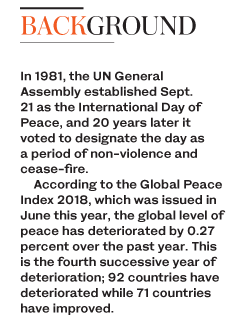DUBAI: Eight-year-old Anjuman, living in Camp 7 at Kutupalong refugee camp in Cox’s Bazar, Bangladesh, has received the most beautiful gift. “I am very happy to have received this dove. I like it so much,” she said.
She is among 150 children in the camp who have received “peace doves” from Dubai after winning an art competition organized in the camp.
To celebrate the UN-declared International Day of Peace on Friday, a Dubai-based humanitarian relief group, NRS International, and a UK-based NGO, Empathy Action, have given wings to a message of hope, peace and reconciliation.
Both these organizations have come together to make dove toys (symbolizing peace) to distribute among children, who are among the first victims of conflict in any part of the world.
And while peace isn’t something the world often associates with the Middle East, there are plenty of ways in which countries in the region are trying to make the world a better place, from smaller initiatives such as the doves in Bangladesh to major efforts such as the peace deal brokered this week by Saudi Arabia between Ethiopia and Eritrea.
The peace doves were handmade by women at NRS International’s factory in Pakistan. As many as 650 dove toys have been stitched and handcrafted from upcycled offcuts of refugee blankets and tarpaulins.
“Each dove, made from excess blanket material that normally keeps refugees warm, is a symbol of peace,” said Wieke de Vries, head of corporate social responsibility at NRS International. It is the leading supplier of humanitarian relief items such as fleece blankets to UN agencies and international aid organizations.
Sandy Glanfield, innovations manager at Empathy Action, said the doves will carry a reminder that for 68.5 million displaced people worldwide, a blanket or tarpaulin is a basic necessity to survive. “The passionate and skillful women who made the doves add the love into this story,” said Glanfield.
About 150 larger versions of peace doves have been distributed to Rohingya refugee children in Bangladesh camps, with the support of the Danish Refugee Council.
S.M. Atiqur Reza, who is a child protection assistant at the council, said that the peace doves have put smiles on the faces of the children in the refugee camp.
“The children were so excited, and they loved these doves and making plans to take it back home (whenever they go back home).”
But in a world of conflicts, there is still much to be done. Anjuman is just one of nearly 25.4 million refugees in the world, over half of whom are under the age of 18.
Dr. Hadia Aslam, who sets up health care systems for refugees in Europe and the Middle East, is not hopeful about world peace in the near future.
“I feel we have desensitized entirely to any atrocity that happens now. Nothing shocks us. I do not see a future for peace, but I do see conflict. Our systems are geared to hosting this,” said the young doctor, who is the founder of a charity that has treated thousands of refugees in Europe.
For her, human rights violations by Israel are a major threat to world peace. “I don’t know a lot about politics, but I can categorically raise concerns about Israel’s human rights track record being astounding and the world silently watching. Their only motive is occupation and apartheid. There is no space for peace in such a place.”
Vidya Bhushan Rawat, a leading peace activist based in New Delhi, said that the biggest threat to peace is injustice and growing inequalities.” I don’t think that the world has become a peaceful place at the moment. There is a steady growth of right-wing politics the world over, where minorities and immigrants are considered a threat to the nation.
“To protect the only planet we have we need to eradicate poverty, illiteracy, hunger, malnutrition, gender disparity and superstition from our societies.”
Dr. Kamran Bokhari, director of strategy and programs at the Center for Global Policy in Washington, does not see peace becoming the norm any time soon.
“We constantly hear about peace talks. But seldom do these efforts produce actual peace. The rise of nationalism is undoing the internationalist order that we thought would gain ground after the end of the Cold War a quarter of a century ago. Meanwhile, non-state actors are filling the vacuums left behind by weakening states, which suggests greater, not less, global conflict.”
Dr. Shehab Al-Makehleh also believes that the world is less peaceful now than it has been in a long time. “Right now, peacefulness is at the worst level of any time since 2012. By the end of 2017, 1 percent of the world population had been refugees and displaced,” said the executive director of Geostrategic media in Washington, DC.
He does not expect things to improve unless decision-makers in the international community give this matter attention as the world will be witnessing new economic and financial crises that could turn major countries into enemies.
“Unless the UN takes necessary measures that the world does not fall into anarchy due to populism and nationalism, the domino effect will cross borders, causing insecurity at all levels, toppling some regimes and changing borders with hundreds of thousands of people dying of poverty and terrorism,” Dr. Al-Makehleh said.
All the more reason to bring hope to children such as Anjuman. As Reza said of the Rohingya children in the camp: “They want peace. They say they want to go back home. They want to go to their schools and study. They find the camp is a very small place to live. They are really sad here.”































